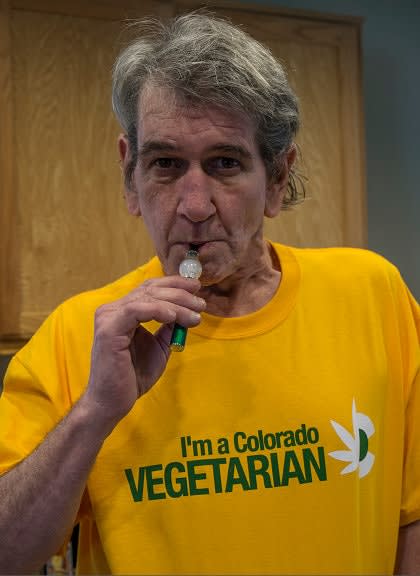Colorado's marijuana DUI law is modeled on the one for alcohol, which sets a number to determine when someone is too intoxicated to drive. For pot, that number is five nanograms of THC per milliliter of blood. Anything above that and the law says you shouldn't be driving.
Legal Weed States Have Trouble Defining "High" Driving
It turns out, measuring a person's THC is actually a poor indicator of intoxication. Unlike alcohol, THC gets stored in your fat cells, and isn't water-soluble like alcohol, says Thomas Marcotte, co-director of The Center for Medicinal Cannabis Research at the University of California, San Diego.

More states may come up with their own marijuana DUI guidelines. Voters in five states from California to Maine are deciding this November whether to legalize recreational marijuana. They're weighing the good, the bad and the still unknown. Issues like driving while stoned are still in the "unknown" category.
It turns out, measuring a person's THC is actually a poor indicator of intoxication. Unlike alcohol, THC gets stored in your fat cells, and isn't water-soluble like alcohol, says Thomas Marcotte, co-director of The Center for Medicinal Cannabis Research at the University of California, San Diego.
"Unlike alcohol, which has a generally linear relationship between the amount of alcohol you consume, your breath alcohol content and driving performance, the THC route of metabolism is very different," he explains.
That's why adapting drunk driving laws to marijuana makes for bad policy, says Mark Kleiman, a professor of public policy at New York University. "You can be positive for THC a week after the last time you used cannabis," he says. "Not subjectively impaired at all, not impaired at all by any objective measure, but still positive."
Still, Colorado and five other states have such laws on the books because pretty much everyone agrees that driving stoned can be dangerous, especially when combined with alcohol.
What cops really need is a simple roadside sobriety test. Scientists at UCSD are among researchers working on several apps that could measure how impaired one is behind the wheel. One has a person follow a square moving around a tablet screen with a finger, which measures something called "critical tracking." Another app measures time distortion, because things can slow way down when a person is high, NPR reports.
More Patrol

Safariland Solis Rethinks Concealable Duty
What if Level I retention didn’t require a full duty rig? Safariland’s Solis delivers trusted ALS security in a streamlined OWB platform built for administrative and plainclothes professionals who need protection without the bulk.
Read More →
K-9s Play a Critical Role in Finding Missing Persons
Real-world scenarios show that a tracking canine can detect and follow a human track several hours after it was made.
Read More →
Garmont Tactical’s LE Boot Lineup
In this video, we get a look at the latest law enforcement boots from Garmont Tactical, both for men and women. Kyle Ferdyn, sales manager, showcases four of the latest boots.
Read More →
Avon Protection Launches EXOSKIN-S2 High-Performance CBRN Protective Suit
With the commercial availability of Avon Protection’s EXOSKIN-S2, users now have increased options for their protective suit requirements across the spectrum of CBRN threat environments.
Read More →
Versaterm Acquires Aloft to Unlock a New Era of Drones for Public Safety
Versaterm has acquired Aloft, an FAA-approved Unmanned Service Supplier (USS) that specializes in real-time airspace intelligence and flight authorizations.
Read More →
Versaterm Launches Innovation Summit for Public Safety Drone Operations
The two-day DroneSense Innovation Summit by Versaterm will bring together public safety and industry experts to define best practices for scaling drone operations.
Read More →
What Makes a Good LE Boot?
Learn what makes a boot good for police officers as POLICE visits with Kyle Ferdyn, of Garmont Tactical, who explains the features of boots and why each is needed in an LE boot.
Read More →
Folds of Honor Opens Scholarship Application for Children and Spouses of Fallen or Disabled Service Members and First Responders
The application period for the Folds of Honor scholarship program is now open through the end of March. Scholarships support students from early education through postsecondary studies, easing the financial burden for families who have given so much in service to others.
Read More →
Team Wendy Now on GovX: Faster Verification and Discount Access for Eligible Professionals
With GovX verification now integrated directly into the Team Wendy checkout experience, eligible customers can confirm their status in just a few clicks and have the discount applied automatically.
Read More →
5.11 Debuts 2026 Footwear & Apparel at SHOT Show
5.11 showcased new apparel and footwear products during SHOT Show 2026, including new color options for the A/T Boa Lite Mid Boot and the Founder’s Jacket.
Read More →
